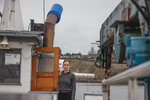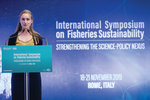At a United Nations sustainable fisheries conference in a posh conference center in Rome three weeks ago, it was “Your Excellency” this and “Minister that” until the master of ceremonies stilled the room to introduce a fishing boat captain.
This item is available in full to subscribers.
We have recently launched a new and improved website. To continue reading, you will need to either log into your subscriber account, or purchase a new subscription.
If you had an active account on our previous website, then you have an account here. Simply reset your password to regain access to your account.
If you did not have an account on our previous website, but are a current print subscriber, click here to set up your website account.
Otherwise, click here to view your options for subscribing.
* Having trouble? Call our circulation department at 360-385-2900, or email our support.
Please log in to continue |
|


At a United Nations sustainable fisheries conference in a posh conference center in Rome three weeks ago, it was “Your Excellency” this and “Minister that” until the master of ceremonies stilled the room to introduce a fishing boat captain.
That captain was 34-year-old Rebecca Argo, co-owner of a pair of salmon tenders that operate out of Port Townsend’s Boat Haven, serving southeast Alaska.She took to the stage to encourage governments worldwide to model their policies on Alaska rules she works under that favor small-scale fishing companies and protect indigenous peoples’ place in the industry.
“Salmon fishing permits may only be owned by an individual or the state of Alaska,” she told the crowd. “The permit holder must be present when the vessel is fishing. This prohibits corporations from owning all the permits, and discourages consolidation of the salmon fishery. It also enables a fisher to use the permit as collateral if they need to secure a business loan. Thus, people like me have an opportunity to finance their fishing business.”
She reflected on the remote places where her company picks up the catch, hustling it to market so fishing boats are free to keep working. “The fishermen in the villages I serve are mainly Aleute natives. I feel lucky to meet indigenous people living and thriving off the ocean, just as they always have. I hope that their way of life can continue. I am excited to be here today, surrounded by people from all over the world who share the same sentiment and are working towards sustainability.’
Argo’s trip to Rome started when Vera Agostini, the Deputy Director of the Fisheries and Aquaculture Organization of the U.N. told a friend the conference needed a young female angler to balance the opening day of a global gathering of policy makers and industry leaders.
Word got to Caroline Gibson at the Northwest Straits Foundation, who immediately thought of Argo, a troller, gill-netter and now co-owner and captain of a salmon tender.
“I had just walked past Becca and Ozzie’s boats at the dock when I heard that Vera was looking for a young female fisherman,” Gibson said. “Becca immediately came to mind. She’s a natural face for the industry; hardworking, fun, articulate, independent and adventurous.”
Which is how a Boat Haven regular came to be standing in front of 300 dignitaries and experts on Nov. 18, telling them how fishermen see the future.
“I was not scared,” Argo said, upon returning to Port Townsend. “I knew I had written a good speech that made sense. The UN flew me there, paid for my hotel, gave me a per diem because I was going to tell my story. To make good policies and to start managing global fisheries, they’ve got to involve the fishermen.”
So she kept it personal.
“I was lured into the fishing world by a 24-foot wooden boat built in 1890,” Argo told the hundreds of dignitaries, experts and U.N. staffers at the conference. “To this day I remain amazed that I participate in one of the world’s last wild salmon runs, in Alaska, a place known for having one of the world’s best managed fisheries. This is in part due to Alaska being the only state in the U.S. that has the sustainability of natural resources written in the state’s constitution.”
Argo, 34, doesn’t have a fancy title, just boots-on-deck experience: mariner on the Reba H, a 24-foot hand troller, then five years as a net-builder and deck-hand on the Vego, a gill-netter and then, last summer, captain of the Sunnyvale, a salmon tender that picks up the catch from fishing boats and delivers it to the canneries that get fish to market, be it frozen, canned or other.
She and her life partner, Ozzie Anderson, who got his start as a shipwright, are now 50-50 business partners. After selling their gill-netter, Vego, and their Alaska salmon permit, they bought the 76-foot tug McClure Bay and turned it into a salmon tender. With that asset on the books, they obtained a bank loan to buy their second 76-footer, the scow Sunnyvale, which she captained last summer.
Her perspective - a woman in charge - was what the U.N. was after when it invited her to the conference.
Argo said U.N. scientists had front-loaded the conference with a collection of studies that suggest the sea will be a key source of food as the planet’s population rises from 7.7 billion to 10 billion. ”Scientists think the ocean could provide 15% more protein if they were better managed or if climate change could be slowed down. (It was) a call to action for countries all over the world to fight climate change.”
Argo said workshops and seminars during the multi-day conference opened her eyes to to ways women are marginalized in food and seafood industries around the globe.
In her opening-session speech, she addressed that head-on. “I deliver freight to Chignik, an isolated fishing village on the tip of the Alaskan Peninsula,” she said with a serious face. “Alaska is rugged, fierce...and masculine. I learned the importance of good posture and even maintaining a deep voice when talking to our fishermen,” she said to chuckles from the crowd. “It was entertaining to set our anchor in bays where the fisherman would boat out to us, and tie up alongside our vessel. The first question was usually, ‘So where is your captain?’ I would raise my hand and stand up tall. ‘She’s right here.’”
Argo, who is 5-2, 107 pounds, smiled as the crowd imagined her staring down fellow fishing boat captains.
“It served well to have me there to loosen everybody up,” she said. “These people sit behind desks. They’re not actually on the water.”
She said her story generated feedback from participants. “Being a female and having had such a powerful position, captaining, was inspiring to people there,” she shrugged.
“She’s exceptional, so I’m really glad they picked her,” said Port of Port Townsend Commissioner-elect Pam Petranek, who also works in the Port Townsend-based Alaska salmon fleet. She and her partner operate Cape Cleare Fishery, a small-scale company that trolls for Alaska salmon, flash freezes them and markets direct-to-consumers upon returning to Port Townsend.
“I hope that she represents the quality of the environment that is needed to sustain our fisheries,” Petranek said. “And I believe she has those environmental concerns and standards. As an Alaska fisheries person, you’re concerned about that,” said Petranek, who said offshore oil drilling, fish farming and the Pebble copper mine proposal in the Bristol Bay, Alaska watershed.
Gaelle Hermanus, a staffer at the United Nations Food and Agricultural Organization, said the symposium’s task was to lay ground-work for a proposed code of conduct for responsible fisheries that the United Nations group will urge countries around the world to adopt.
“Overall, the different thematic sessions were very productive and will contribute to a new, positive narrative for fisheries in the 21st Century,” Hermanus said.
Messages like Argo’s will be used at the UN Ocean Conference in June 2020 in Lisbon.